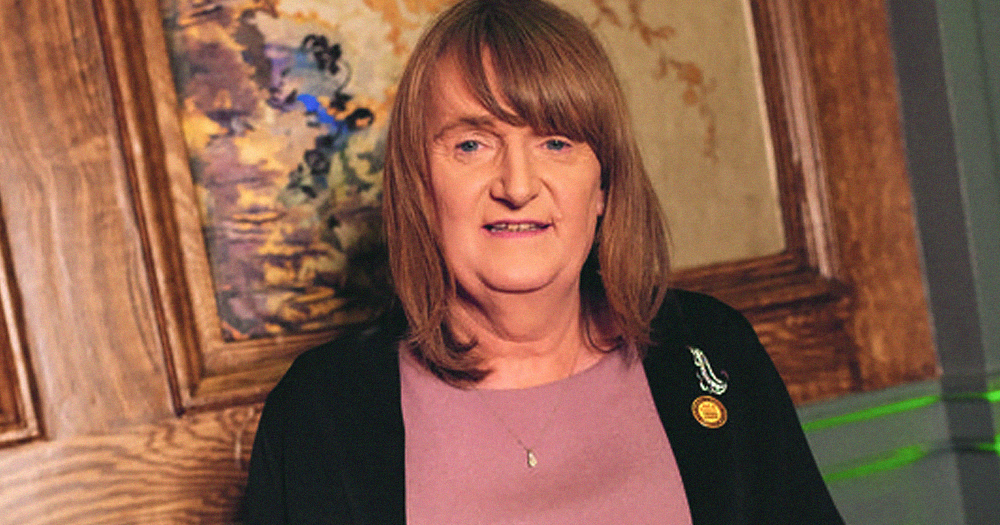To mark 10 years since the Gender Recognition Act was passed in Ireland, we have dug into the depths of the GCN Archive to uncover how the magazine covered the struggle that led to the passage of the law. In this article from GCN Issue 312, activist Sara R Phillips, who was Chair of TENI, reflected on how the change in legislation must be accompanied by social change.
It has been an unbelievable year, a year from which we can believe in an Ireland we all want to live in. With the huge Yes vote in the marriage referendum and the passing of progressive gender recognition legislation, we can look forward to a bright future. However, with legislative change must come social change.
For the transgender community, the gender recognition legislation is still not perfect. It excludes and continues to marginalise many sections of our community. The legislation excludes under 16s, non-binary and intersex people, and creates unnecessary restrictions on 16 to 18 year olds. Gender identity and gender expression still need to be included in the grounds of discrimination. Guidelines in education are crucial and urgently needed for the wellbeing of young transgender people navigating an already difficult path through school. Healthcare is also a matter of concern. Presently, there is no transition healthcare pathway and we still await the publication of the HSE guidelines.
Another area of concern is employment. In Speaking from the Margins, TENI reported that 51% of transgender respondents were in employment. Many more expressed some terrible experiences in both trying to access employment, and while in employment. For most transgender people, getting past the interview stage is a mountain they struggle to climb. Employers consistently avoid employing the transgender applicant and often opt for a lesser candidate.
Social change in employment will require a change of mindset from employers to see past the transgender issue and employ individuals on merit. It will require the transgender community to be braver, to believe in itself, to reach for the opportunities they are capable of. All of this will require education. Education of employers and education of our own community.
Earlier this year TENI ran two successful back-to-work programs to bring about this social change, helping transgender attendees to prepare CVs, prepare for interviews, and build their confidence to get back to work. TENI also recently employed a Training Officer to engage and educate employers.
However, some individuals feel that they have to hide their gender identity or transgender history to retain their employment and to ensure their personal safety. Even my own transition was fraught with the fear of not getting through the interview or losing my job. At the outset, I was not confident that interviewers or companies would consider my application in an equal manner. Having spent over 20 years in management positions, and having employed many people myself in that time, I assumed and believed, their first thought would be to ignore an application from a transgender person, especially in the construction sector.
However, I have been one of the lucky ones. With Tremco illbruck, I was very lucky. I found a manager, Mark Leigh, who listened. The company acted similarly, and did not shy away from the process. They became fully engaged and they allowed me to design the plan. Because this was something new for them, there were fears, but they didn’t allow those fears to get in the way, and ni the end itwas a simple process.
From an employment point of view, my transition has allowed me to live up to my abilities. Increasing my potential and improving my performance, removing all the debris that was hiding who I really am, improving my mental health and allowing me to concentrate on what is important: life. I no longer worry about being found out; I have nothing to hide anymore, no longer having to worry about what people might think. But most of all, my transition has allowed me to be me.
To quote Tremco’s HR manager, Debbie Mullerworth: “Attracting and retaining talent is a challenge that every company has to face. By having an inclusive workplace, one where employees are recognised and valued regardless of their gender identity, brings great benefits to a company. We want staff to feel respected and enabled to be themselves and by removing the barriers that prevent them from doing so will increase engagement, motivation and productivity – this is turn can only have a positive impact on the company, helping to go from strength to strength”.
It is important to remember that not all transgender people are the same as me. I was lucky, I had a lot of experience, I was also sure if the company supported me, then staff and clients would follow suit. All transgender people should be supported to be themselves. The fact that Tremco took a positive, respectful and decisive view of my transition was, without doubt, intrinsically linked to the successful outcome.
It shouldn’t be a negative process that an employer considers when faced with someone wishing to transition. tI should be a process al employers embrace. Diversity brings benefits. I would like to leave you with a thought.
One of my clients told me once, when I asked him how come he had taken it all in his stride: “If a company can treat its staff properly, be open to new ideas and welcome diversity, then they are going to treat their clients properly and work in partnership ot fulfil their common goals.”
That client remains my biggest customer today and someone who si loyal to the Tremco brand. My positive visibility mattered.
Stay tuned for more articles from 2015 as part of the #GenderRec10 campaign. To look through the GCN Archive for yourself, see the issues from 1988 to 1998 here, and more recent issues here.
© 2025 GCN (Gay Community News). All rights reserved.
This article was published in the print edition Issue No. 312 (December 1, 2015). Click here to read it now.
Support GCN
GCN is a free, vital resource for Ireland’s LGBTQ+ community since 1988.
GCN is a trading name of National LGBT Federation CLG, a registered charity - Charity Number: 20034580.
GCN relies on the generous support of the community and allies to sustain the crucial work that we do. Producing GCN is costly, and, in an industry which has been hugely impacted by rising costs, we need your support to help sustain and grow this vital resource.
Supporting GCN for as little as €1.99 per month will help us continue our work as Ireland’s free, independent LGBTQ+ media.

